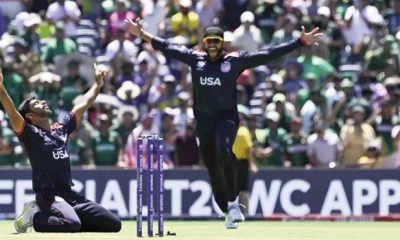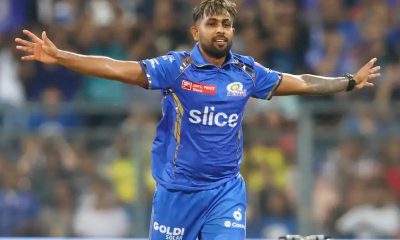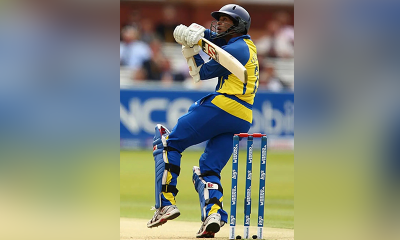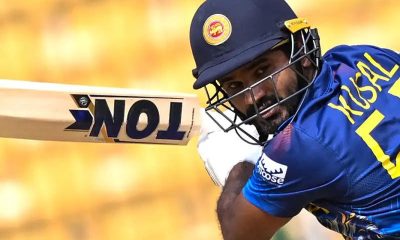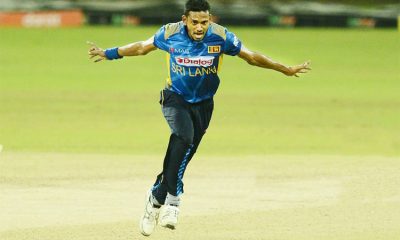Editorial
The State of Cricket

Thursday’s parliamentary debate of the state of affairs at Sri Lanka Cricket (SLC) will surely resonate with all lovers of cricket. There is no need to labour over the fact that few things are right, and most things are wrong at SLC. That obviously affects the morale of the players as well as the national psyche. Sports Minister Roshan Ranasinghe’s declaration that many covetous (political) eyes are being cast on his portfolio because of the big bucks SLC commands needs no elaboration.
Many are the men who served the game because of their passion for the sport. But cricket has become a multi-million dollar business nowadays and there’s intense rivalry to win cricket elections while most decent men keep away from contesting. As Muttiah Muralitharan once said, if he contests the General Elections from any district, he will win it hands down but he didn’t stand a chance to win the SLC elections.
Robert Senanayake’s contributions to cricket were immense as he functioned as President of the Board of Control of Cricket for 16 long years uninterrupted. After him, other notable politicians like Dr. N.M. Perera, T.B. Werapitiya, Lakshman Jayakody and Tyronne Fernando headed the board. Cricket in Sri Lanka got a facelift when Gamini Dissanayake, a powerful Minister of JRJ’s government took charge in 1981.
By this stage, Sri Lanka’s bid for full membership of the International Cricket Council had been turned down on several occasions with the sport’s founding members England and Australia using their veto powers. Dissanayake, a meticulous planner, got down the Australian cricket officials to Colombo prior to the ICC meeting in 1981 and showcased to them the standard of the sport in the country and the cricket infrastructure. When he went for the Lord’s meeting that year, Australia supported Sri Lanka’s bid and once the Aussies were on board, England felt that they were fighting a losing battle.
Dissanayake succeeded in his first attempt helping the country gain Test status. He was surrounded by other capable men like Killy Rajamahendran, Neil Perera, Nisal Senaratne, S. Skandakumar, Anura Tennekoon et al. There was smooth sailing and under the visionary stewardship of Ana Punchihewa, the country went onto win the World Cup in 1996. Yet, a mere two weeks after the World Cup triumph, Punchihewa lost the reelection with his deputies Upali Dharmadasa and Thilanga Sumathipala challenging him. It was a bitterly contested election and even NCC’s representative voted against the wish of the club’s mandate.
The club duly suspended their representative but Dharmadasa in his wisdom made the individual a member of the national selection panel. Since then, it has been all downhill for the sport. Big money has been spent on cricket elections and ICC investigations have exposed how a board chairman paid a Sports Minister from a television deal, the money that was supposed to have been spent on development of the sport.
Former President Chandrika Kumaratunga did try to address the issue. In 1999, she sacked the board and put in place the first ever Interim Committee with reputed banker Rienzie T. Wijetilleke as the Chairman. Wijetilleke was never a cricketer but what he brought into the board was financial discipline. Sri Lankan cricket thrived in the early 2000s with other capable men like Hemaka Amarasuriya and Vijaya Malalasekara heading the board.
However, with Chandrika gone, politicians misused Cricket Interim Committees appointing their buddies to this august body, some of whom had contested the cricket elections and lost. What Parliament debated on Thursday is merely the tip of the iceberg. True, a colossal sum had been wasted on purchasing air tickets for the kith and kin of Executive Committee members of SLC. But there are more serious issues that need to be investigated.
In 2018, instructions were sent from the CEO’s office to the company that owned the television rights of SLC to transfer funds to an offshore account. SLC lost huge sums of money and despite intensive investigation, the findings have been pushed under the carpet and nobody has been punished.
Journalists who expose corruption at SLC have been punished with their accreditation to cover games revoked. Three journalists are considered persona non grata by the SLC. The board has also taken over 10 media institutions to court this year effectively putting an end to their criticism. This has been a major blow for press freedom and something that had never happened before.
The Sports Minister made some pertinent points in Parliament where he exposed that the board had been spending millions of rupees as legal fees to cover their tracks. The Minister went onto say that lack of discipline among players is because the board itself did not maintain the right standards. As a result, a Sri Lankan cricketer was jailed in Australia and currently he is on bail awaiting the verdict from a Sydney court after allegations of sexual harassment.
It must be also mentioned that three players were sent home from England two summers ago for breaching the bio-secure bubble. A retired judge who conducted the investigations recommended a two-year suspension for bringing the game into disrepute and lack of remorse. SLC in their wisdom reduced the suspension to one year and further brought it down letting the players off with a mere slaps on the wrist.
Under the current administration, the Test captain was charged for drunk driving while another contracted player was involved in a hit and run incident at Panadura three years ago. He was released on bail and while on bail, SLC went ahead and appointed him as the Vice-Captain of the national cricket team. So much for the standards in cricket.
Mike Brearley, one of the finest captains the game has seen, in his book, ‘The Art of Captaincy’ goes onto comment that a fish rots from its head. That exactly what has been happening to Sri Lanka Cricket.
Editorial
Ensure safety of COPF Chairman

Saturday 8th June, 2024
It was with shock and dismay that we received the news about death threats to COPF (Committee on Public Finance) Chairman Dr. Harsha de Silva over the ongoing parliamentary probe into the on-arrival visa scam. Dr. de Silva yesterday told Speaker Mahinda Yapa Abeywardena, in Parliament, that he was facing death threats and intimidation, and it was incumbent upon Parliament to ensure his safety. He stopped short of naming names, but revealed that some ruling party MPs were among those who had ganged up against him. The Speaker only said there had been no complaint, and he would look into the matter.
The SLPP-UNP government has been doing everything in its power to have all parliamentary committees under its thumb. The COPE (Committee on Public Enterprises), which once helped restore public faith in the legislature by exposing state sector corruption, has now become a mere appendage of the incumbent regime, thanks to the appointment of SLPP MP Rohitha Abeygunawardena as its Chairman. The SLPP-UNP combine also tried to oust COPF Chairman Dr. de Silva, but in vain. However, it knows more than one way to shoe a horse.
The COPF, under Dr. de Silva’s chairmanship, has been a thorn in the side of the government, which is struggling to cover up numerous corrupt deals. Dr. de Silva yesterday told Parliament that he found it extremely difficult to function as the COPF head due to severe resource constraints his committee was facing; he himself had to pay the salaries of some of his staff members besides burning the midnight oil.
The sheer workload he had to cope with as the COPF chief had taken its toll on his health, he said, informing the Speaker that he was at the end of his tether, and at times thought of resigning from the COPF. This is exactly what the government wants him to do; resource squeezes and threats are aimed at making him quit.
On 26 May, Dr. de Silva revealed, in an ‘X’ post, that the COPF had uncovered some vital information about the visa scam and it would reveal everything after its final meeting on the issue; the COPF was committed to exposing the truth behind the controversial tender, he added. In an editorial comment on 27 May, we warned him.
While thanking him for his bold stand, we pointed out that by making such a statement, he had thrown caution to the wind, and become a marked target, with the government making an all-out effort to delay the COPF investigation lest the truth should come out much to the detriment of its interests in this election year. Unfortunately, what was feared has come about; Dr. de Silva is complaining of death threats and government moves to strangulate the COPF financially to derail its investigations.
Dr. de Silva’s predicament exemplifies the fate that befalls the few good men and women in Parliament. It is hoped that all those who seek an end to the state sector corruption will rally behind Dr. de Silva, and bring pressure to bear on the government to ensure his safety. Let Dr. de Silva be urged to reveal the names of those who have issued threats, veiled or otherwise, to him and are trying to scuttle the COPF probes.
Editorial
Dead man walking!

Friday 7th June, 2024
The SLPP-UNP government is going hell for leather to make bad laws as if there were no tomorrow. It is abusing its parliamentary majority, which has been retained with the help of some crossovers, for that purpose. The Opposition, the media and trade unions are up in arms, and understandably so. The incumbent regime is a dead man walking; it is so desperate that it is capable of anything. Hence the need for it to be restrained.
The Electricity (Amendment) Bill (EAB) plunged Parliament into turmoil yesterday, but the government secured its passage. The Supreme Court (SC) determined the entire EAB inconsistent with the Constitution and recommended changes thereto. After unveiling the Bill, sometime ago, Minister of Power and Energy Kanchana Wijesekera hailed it as an excellent piece of legislation aimed at straightening up the power sector to serve the public interest better.
The SC determination left him with egg on his face. He reminded us of the proverbial curate who, while eating a stale egg, assured his host, a Bishop, that parts of it were excellent. Wijesekera’s egg, as it were, made Parliament stink yesterday, but he sought to please his masters by praising it as a silver bullet.
EAB should have been discarded and a new one drafted in consultation with all stakeholders. But the government is apparently driven by an ulterior motive; its aim is not to serve Sri Lanka’s interests but to look after those of some moneybags.
It is not uncommon for Bills to contain some flaws, which are rectified either before or during the committee stage. But there is something terribly wrong with draft Bills that are full of sections inconsistent with the Constitution. The drafters of EAB have demonstrated their sheer ignorance of the supreme law, and that they are not equal to the task of drafting Bills. If they had read the Constitution at least perfunctorily, they would not have drafted such a bad law.
Ignorant and incompetent, they do not deserve to be paid with public funds and must be sent back to law school. They must be summoned before Parliament and questioned on their serious lapses, which have caused public faith in the national legislature to diminish.
Curiously, the MPs who demand that judges, doctors, Central Bankers, and other public officials be summoned before Parliament have taken badly drafted Bills for granted. The power sector trade unions yesterday alleged that EAB was of Indian origin and geared towards furthering the interests of Adani Group at the expense of Sri Lanka.
Most critics of EAB are agreeable in principle to the need for power sector reforms; the Ceylon Electricity Board should be given a radical shake-up, and transformed into a modern organisation capable of providing a better service at a lower cost. They only asked the government to tread cautiously, consulting all stakeholders and taking action to ensure that the country’s interests prevailed over everything else. But the government was in a mighty hurry to steamroller the Bill through Parliament, making the Opposition ask whether it was doing so at the behest of some external forces involved in controversial power generation deals here.
What is passed by the current Parliament can be either amended or abolished by a future parliament in a constitutionally prescribed manner. But that does not mean that a government is free to pass bad laws, making the country enter into long-term agreements with powerful nations and their investors. It looks as if the SLPP-UNP regime did not care two hoots about the consequences of its actions.
Editorial
Modi Magic on the wane

Thursday 6th June, 2024
The outcome of India’s parliamentary election (2024) has led to a ‘perspective ambiguity’. Prime Minister Narendra Modi lost no time in declaring victory for the BJP-led NDA alliance, which secured 293 seats in the 543-member Parliament, but he must be a worried man. The BJP is short of 32 seats to form a government under its own steam; it has lost 63 seats or about 20% of its parliamentary strength. It had 303 seats in the previous Parliament, and that number has dropped to 240.
Modi has become the second Indian Prime Minister to win a third term. The first PM to do so was Jawaharlal Nehru. But Nehru won an outright majority in Parliament in 1962; Modi has had to depend on smaller parties in his alliance to retain his hold on power. Modi must be reeling from a sharp drop in his victory margin in his own constituency, Varanasi; it has decreased to 152,000 from 480,000 in 2019 whereas Modi’s bete noire, Rahul Gandhi, won Raebareli by a staggering 390,000 votes.
Modi, who reigned supreme with 303 seats in the previous Parliament, is now dependent on parties such as Nitish Kumar’s JD-U and Chandrababu Naidu’s TDP to form a government. He has had to lead an alliance of strange bedfellows. Both Kumar and Naidu were bitter critics of Modi. Kumar helped form the oppositional alliance, the INDIA bloc, before switching his allegiance to PM Modi. Naidu also closed ranks with the BJP in the run-up to the election. These politicians have been described as extremely ambitious and highly unpredictable, and whether Modi will be able to manage them and consolidate his grip on the NDA alliance remains to be seen. They will demand plum ministerial posts in return for their support. The TDP is said to be eyeing Transport and Health portfolios! That is the name of the game in coalition politics, where it is not uncommon for the tail to wag the dog, so to speak. These two political leaders are however not the only problem Modi will have to contend with. The next five years will feel like an eternity for PM Modi.
Nothing would have been more shocking for the BJP than its defeat in Uttar Pradesh’s Faizabad constituency, where the Ram Mandir has been built. Modi may have thought he would be able to win the Lok Sabha election hands down after the consecration of that temple, which became a centrepiece of the BJP’s election campaign. The BJP lost that seat to the Samajwadi Party! Modi must be disappointed that the Ram Mandir hype failed to trigger a massive wave of support for his party. This particular defeat signifies a massive setback for the BJP’s ethno-religious agenda.
Modi’s divisive election campaign failed to yield the desired result. The BJP’s failure to secure an outright majority could be attributed to a host of factors, some of them being the suppression of the Opposition, the arrogance of power, chronic unemployment, and the rising cost of living. The BJP also did not care to reimage itself in a positive light to attract the youth.
Modi will hereafter see the Congress-led INDIA bloc with 223 seats, in his rearview mirror. The Congress (99 seats) and its allies have eaten into the BJP support base considerably, but they have a long way to go before being able to capture power.
The bumpy ride ahead for the BJP-led coalition government to be formed may improve the INDIA bloc’s chances of bettering their electoral performance and turning the tables on the BJP and its allies in time to come. Modi will have a lot to worry about in his third term.


